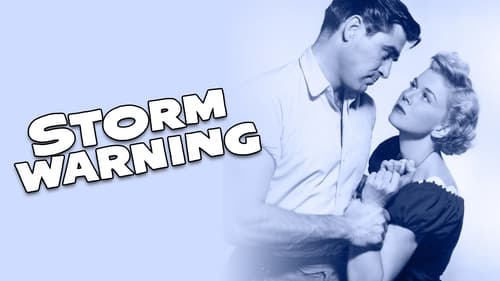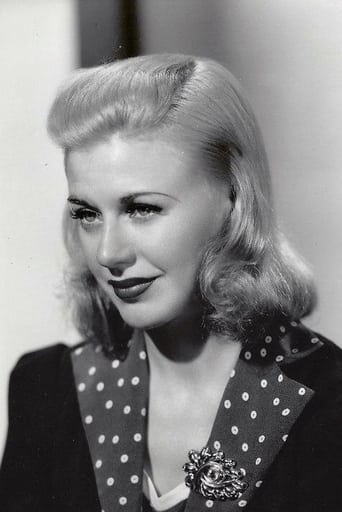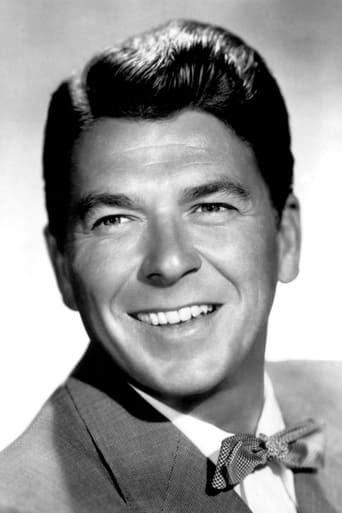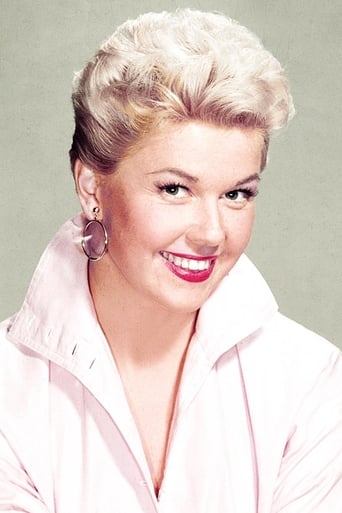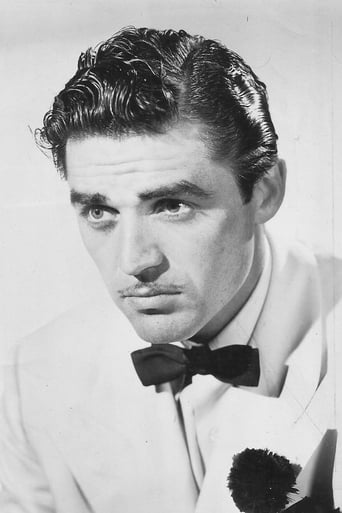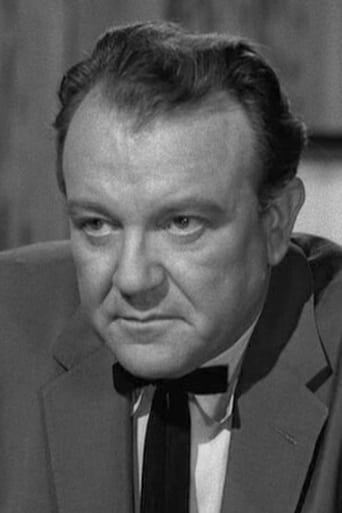Cubussoli
Very very predictable, including the post credit scene !!!
Erica Derrick
By the time the dramatic fireworks start popping off, each one feels earned.
Bumpy Chip
It’s not bad or unwatchable but despite the amplitude of the spectacle, the end result is underwhelming.
Dana
An old-fashioned movie made with new-fashioned finesse.
jacobs-greenwood
Directed by Stuart Heisler, and written by Richard Brooks and Danial Fuchs, elements of this solid drama might remind some of the more famous Elia Kazan-Tennessee Williams drama released six months later that same year, A Streetcar Named Desire (1951). Though this one's main emphasis is the Ku Klux Klan, aka the KKK, both feature a sister that comes to visit another who's married to a Southern male brute, causing conflict (and more, without spoiling either film).Ginger Rogers (somewhat miscast) plays Marsha Mitchell, a New York dress model who arrives on the 10 PM bus in Rock Point to stopover and visit her sister on the way to Riverport. Shortly thereafter, she witnesses a murder: some white robed, white hooded persons drag another man out of the town's jail. Their prisoner escapes and runs for his life from the gang but is shot before rounding the corner of a building, falling right in front of Martha, who then hides in a darkened doorway. She then sees two men, their hoods off, come to inspect the body and verify that the man is dead. The gang disperses and Martha runs 10 blocks to the recreation center where her sister, Lucy Rice (Doris Day, her first non-singing role), works.A shaken Martha learns that Lucy is pregnant, and later meets her truck driver husband Hank (Steve Cochran), who was one of the men Martha had seen earlier. She learns later that the other's name is Charlie Barr (Hugh Sanders), Hank's boss and Grand Dragon of the local KKK.Ronald Reagan plays Burt Rainey, a lifetime Rock Point resident and its prosecutor, who decides he finally has the witness he needs in Martha, an outsider presumably not afraid of retribution, to indict the Klan and end their activities in his town.However, Charlie is smart enough to know that his organization isn't safe until Martha leaves town, and that Hank is too dumb to handle it, so he threatens her himself. If only for her sister, Martha agrees to dummy up when questioned again by Burt at the coroner's (Walter Baldwin) inquest. Though he (and the visiting press) is letdown, the rest of the town celebrates into the night.Hank, who'd actually been the triggerman, is the most rowdy of all. When Martha, whose bus doesn't leave until later that evening, comes to the recreation center to get Lucy's house key in order to pack her things, she has a confrontation with Burt who later, his small brain additionally inhibited by alcohol, makes inappropriate advances towards her.Lucy arrives in time to interrupt his attempted rape of her sister, realizes what she's married and promises Martha to leave him, before she's knocked down and out by her husband in a struggle. His Klan buddies arrive to take him to that night's meeting and Hank decides to drag Martha to the affair, where she's whipped in front of a huge group of members that includes women and children!Even though the Charlie Barr character defends it as a necessary service (without them, women like Martha wouldn't be safe to walk the streets at night), much of the film's dialogue delivers the requisite indictment of the KKK and its members, too scared to act without the courage of numbers or show their faces (hence the hoods).But there's a twist - Barr's real motivation is financial: there's real money for him in the dues etc. such that he's portrayed like a corrupt union boss, or worse (a capitalist;-)In the end, while Burt has come to save the day and Martha, Barr's true self centered (vs. all for one) nature is revealed to all, and an enraged and disillusioned Hank ends up killing another, this time (accidentally) Lucy, before the rest of the group wises up and runs for cover as the Grand Dragon pleads for them to stick together.
Spikeopath
Storm Warning is directed by Stuart Heisler and written by Richard Brooks and Daniel Fuchs. It stars Ginger Rogers, Ronald Reagan, Doris Day and Steve Cochran. Music is by Daniele Amfitheatrof and cinematography by Carl E. Guthrie. Stopping over to see her sister in Rockpoint, model Marsha Mitchell (Rogers) witnesses the Ku Klux Klan committing a murder and sees two of the perpetrators with their hoods off. Upon arriving at her sister's house, she is stunned to find that the beau of Lucy's (Day) life is one of the killers! Should she do what is morally right? What District Attorney Burt Rainey (Reagan) wants her to do? Or should she think of her sister and keep Hank Rice (Cochran) out of prison? Lets get the big complaint out the way first. What has been written before is true, the issue of race hatred and the KKK is not dealt with, this really does soft soap that particular issue in favour of a more - less - controversial angle. Film does still portray them as cowardly murderous thugs hiding behind hoods, even portraying them as dimwits following one almighty Grand Wizard (or is it Dragon?) who is more concerned about cash than colour of skin, but trivialisation of a hot topic occurs. We are the law here. The judges and jury! So, accepting it on its own "non social issue message" terms, then it's a thoroughly engrossing piece of film noir styled melodrama. Thematic noir staples are within, with bigotry, fate, family dysfunction and a woman in peril scenario (the fox in the hen house situation is super) all bubbling away under the moral obligation surface. Laid over the top is no short amount of atmospheric style, as Heisler (Among the Living/The Glass Key) and Guthrie (Backfire/Caged) produce dank shadowed streets, misty jails and a big court room segment bathed in slatted shadows befitting the moral discord filtering around the room. Don't give me that Halloween routine. Heisler proves to have a good eye for imagery as well as technical nous, such as snaps of child Klan members or the symbolic falling of a burning cross. He also marshals his cast very well. Don't believe any review that says Rogers is miscast, she simply isn't, she's feisty, sexy and strong, yet vulnerable as well, she's perfect for the role that was originally intended for Bacall who bailed out. And with Day exuding a confused innocence that hits the right notes, Heisler's reputation as a great director of actresses holds weight here. Reagan and Cochran are fine, with Cochran veering away from his normal cool, calculated persona to offer up a characterisation we rarely saw from him. It misses a trick to really strike a dagger in the KKK scheme of things, and yes some of it feels like lower grade Tennessee Williams. However, the makers turn this Southern town into a diseased noir landscape, where the story is paced and performed with skill, and it all builds moodily to a truly great finale. Well worth seeking out. 8/10
ferbs54
A tough family reunion in the small Southern town of Rock Point for sophisticated dress model Marsha Mitchell, in the 1951 thriller "Storm Warning." Before even joining her younger sister for the first time in two years, and meeting her new brother-in-law, Marsha witnesses the beating and shooting murder of an investigative reporter at the hands of the Ku Klux Klan. And later, she realizes that her sister Lucy's husband, Hank Rice, was one of the members at that KKK lynching! What's the poor gal to do...especially when nice-guy county prosecutor Burt Rainey is pressing her to play witness at the indictment? Anyway, that's the setup for what turns out to be a surprisingly tough and gritty suspenser, bolstered by a quartet of excellent performances by the film's stars: Ginger Rogers as Marsha, Doris Day and Steve Cochran as her family, and Ronald Reagan as the crusading prosecutor. At the time "Storm Warning" was made, films depicting the activities of the Ku Klux Klan were not exactly common. "The Birth of a Nation" (1915) had shown the group in a notoriously favorable light, while the 1936 picture "Black Legion," starring Humphrey Bogart, had fudged the issue a bit by calling the hooded vigilantes the Black Legion, despite presenting them as thugs. "Storm Warning" pulls no punches, and to its great credit presents us with a KKK comprised of bigoted average Joes; cowards and blustering bullies hiding behind their cowls and sheets. The film was directed by veteran Stuart Heisler, who had previously worked on such marvelous entertainments as the Susan Hayward vehicles "Smash-up" and "Tulsa" and the minor Bogey films "Tokyo Joe" and "Chain Lightning," as well as with Bette Davis on "The Star." Heisler keeps this picture moving nicely, and fills his screen with constant motion while adding almost noirish elements to his thriller (witness Ginger's nighttime walk right before the lynching; truly, the essence of noir!).As for those previously mentioned performances, Doris is just fine in this early dramatic role (indeed, the story goes that her thesping here paved the way for her to appear in Hitchcock's 1956 classic "The Man Who Knew Too Much"); Cochran (so memorable a few years earlier in "White Heat") offers a perfect portrayal of a truly dangerous dimwit (just note how silkily but stupidly threatening he appears when he says to Marsha, "...a girl's figure's her fortune; you sure got your money invested in the right places!"); and Reagan, here in one of his finest hours, and shortly before appearing in the unjustly maligned "Bedtime for Bonzo," is very likable and appealing, despite what you might feel about his performance as U.S. president three decades later. And Ginger? She is just outstanding, in what might be her grimmest and nastiest moments on film. Viewers may be somewhat aghast as they watch the beloved singer/dancer/comedienne get brutally raped, punched in the face, kidnapped, and subjected to a flogging at a KKK midnight convocation, in the shadow, of course, of a huge burning cross. No moonlit waltzing here, that's for sure; more like a moonlit whipping! Turns out that Ginger could get noirish with the best of them; later that decade, she would appear with Edward G. Robinson in another noirish picture, "Tight Spot," in which she would again face the conundrum: to testify or not to testify. Very much the moral glue that holds the picture together, her character goes from big-city girl, to stunned outsider, to sacrificing sister, to abused victim, to steely avenger, all in the course of 93 minutes. She may not get to do The Picolino in this film, but she sure does manage to get herself into quite a pickle!
JLRMovieReviews
Ginger Rogers is going to visit her sister, Doris Day, who she hasn't seen in two years. When she gets to the small town at night, she encounters very anti-social people. A cab driver won't give her a ride, and shops are closing like there's a fire to go to. She barely got the clerk at the bus station to check her baggage, before he locked up. She had to walk ten blocks to Doris Day at her place of business, because of that....that cab driver. The roads and sidewalks are quiet and everything is deserted. She's walking in the dark, when she hears noises and fighting. A man runs by her and gets shot in the back. A group of people covered with hoods gather around the body, not seeing her, as she is hiding near by. Two men take off their hoods and she sees them. Then she comes to find out later one of them is her brother-in-law, Doris' husband, played by Steve Cochran.Such is the gist of her dilemma. Should she tell what she's seen of the Ku Klux Klan and Steve or stay out of it? Apparently, everyone else has. Ronald Reagen is the d.a. who's been trying to get the Klan run out of town ever since he's been elected. But no one ever remembers anything, knows anything, or has ever seen anything, which must make it very easy for them.This is a very well made film that shows Ronald Reagen and company at their best. Reagan gives a very understated and effective performance as not only a man of the law trying to do his duty, but as a man trying to get at the truth and trying to get others to see things as they really are. And, never at any time does the viewer feel that Ginger Rogers is out of her element, being in a controversial suspense film and not being in a light comedy/musical. While it's great to see Doris Day in something different than her usual fare, it still feels somewhat strange to see her perky and upbeat character in this sobering tale of hatred and bigotry.I was very impressed with this film, particularly as it neared its dramatic conclusion and how well it all came together, where much is expressed with little to no words. If you've never seen "Storm Warning." then you ought to see this intelligent film, that was ahead of its time. I liked and respected Reagan before I saw this, but after wards I think I've grown even more respect for a man who knew this was a project he wanted to be a part of. This may be only a movie, but as actors make choices as to what films to make, this certainly reveals Reagan and his conscience to stand for what is right.Discover "Storm Warning" and learn today that tomorrow can be better if we stand together against intolerance.

